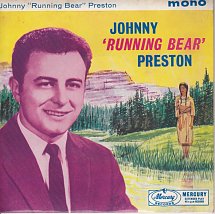
"Running Bear" is a teenage tragedy song written by Jiles Perry Richardson and sung most famously by Johnny Preston in 1959. The 1959 recording featured background vocals by George Jones and the session's producer Bill Hall, who provided the "Indian chanting" of "uga-uga" during the three verses, as well as the "Indian war cries" at the start and end of the record. It was No. 1 for three weeks in January 1960 on the Billboard Hot 100 in the United States and the same on Canada's CHUM Charts. The song also reached No. 1 in the UK Singles Chart and New Zealand in 1960. Coincidentally, "Running Bear" was immediately preceded in the Hot 100 No. 1 position by Marty Robbins' "El Paso", and immediately followed by Mark Dinning's "Teen Angel", both of which feature a death of, or affecting, the protagonist. Billboard ranked "Running Bear" as the No. 4 song of 1960. The tenor saxophone was played by Link Davis.
"We Must Have Been Out Of Our Minds" is a song made famous as a duet by country music singers George Jones and Melba Montgomery. Originally released in 1963, the song became a Top 5 hit on the Billboard Hot Country Singles chart and a country music standard.
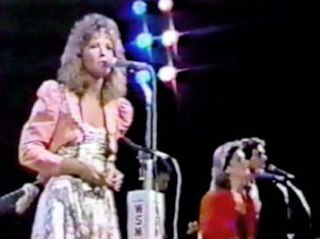
"If My Heart Had Windows" is a country song written by Dallas Frazier and recorded by George Jones in 1967 on his album of the same name. Released as a single that year, Jones's version peaked at number seven on the Billboard Hot Country Singles charts.
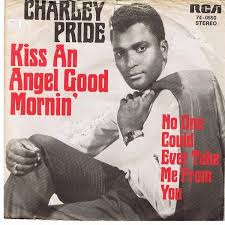
"Kiss an Angel Good Mornin'" is a song written by Ben Peters, and recorded by American country music artist Charley Pride. It was released in October 1971 as the first single from the album Charley Pride Sings Heart Songs. The song has since become one of his signature tunes and was his eighth song to reach number one on the country charts. It was also Pride's only single to reach the Top 40 on the pop charts, peaking at #21 on the Billboard Hot 100, and also went into the Top Ten of the Adult Contemporary charts. It also reached #19 on the U.S. Cash Box Top 100. The song spent four months on the pop chart, longer than any of his other hits. Billboard ranked it as the No. 74 song for 1972.
"The Race Is On" is a song written by Don Rollins and made a hit on the country music charts by George Jones and on the pop and easy listening charts by the unrelated Jack Jones. George's version was the first single released from his 1965 album of the same name. Released as a single in September 1964, it peaked at number three on the Billboard Hot Country Singles chart and at number 96 on the Billboard Hot 100 in January 1965. Jack's version topped Billboard's Easy Listening chart and reached number 15 on the Hot 100 the same year. The two recordings combined to reach number 12 on the Cashbox charts, which combined all covers of the same song in one listing and thus gave George Jones his only top-40 hit. The song uses thoroughbred horse racing as the metaphor for the singer's romantic relationships.
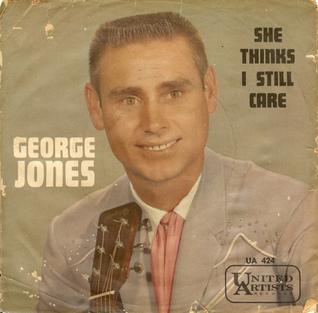
"She Thinks I Still Care" is a country song written by Dickey Lee and Steve Duffy. First popularized by George Jones, the song has been recorded by multiple artists, including Connie Francis, Anne Murray, Elvis Presley and Patty Loveless.
"I Always Get Lucky With You" is a song written by Merle Haggard, Freddy Powers, Gary Church, and Tex Whitson. It was first recorded by Haggard on his 1981 album Big City and then covered by American country music artist George Jones in April 1983 as the second single from the album Shine On. The song was Jones' ninth and final number one on the country chart as a solo artist. The single stayed at number one for one week and spent thirteen weeks on the country chart.
"When Did You Stop Loving Me" is a song written by Donny Kees and Monty Holmes and recorded by American country music artist George Strait. It was released in April 1993 as the third and final single from his album Pure Country. The song reached both No. 6 on the Billboard Hot Country Singles & Tracks chart and on the Canadian RPM Country Tracks chart.

"Love Bug", also spelled "Lovebug," is a song by American country music artist George Jones. Jones' version, which also features a young Johnny Paycheck on backup vocals and draws heavily from the Bakersfield sound as popularized by Buck Owens, reached #6 on Country Songs|Hot Country Singles]] chart in 1965. It was released on his July 1965 New Country Hits album and then re-released as the lead song for his 1966 album of the same name, Love Bug.
"A Picture of Me (Without You)" is a country music song written by Norro Wilson and George Richey.
"She's My Rock" is a song written by Sharon K. Dobbins. It was first recorded by Stoney Edwards and released as a single in 1972. Edwards' version peaked at No. 20 on the Billboard Hot Country Singles chart.
"Tennessee Whiskey" is a country song written by Dean Dillon and Linda Hargrove. It was originally recorded by country artist David Allan Coe for his album of the same name, peaking at number 77 on the Billboard Hot Country Singles chart in 1981. George Jones' 1983 version of the song was included on his album Shine On, and reached number two on the Hot Country Singles chart.
"Same Ole Me" is a song written by Paul Overstreet, and recorded by American country music artist George Jones with The Oak Ridge Boys. It was released in January 1982 as the second single and partial title track from Jones' album Still the Same Ole Me. The song reached number 5 on the Billboard Hot Country Singles chart and number 1 on the RPM Country Tracks chart in Canada.

"Here We Go Again" is a country music standard written by Don Lanier and Red Steagall that first became notable as a rhythm and blues single by Ray Charles from his 1967 album Ray Charles Invites You to Listen. It was produced by Joe Adams for ABC Records/Tangerine Records. To date, this version of the song has been the biggest commercial success, spending twelve consecutive weeks on the US Billboard Hot 100 chart, peaking at number 15.

"(I'm a) One-Woman Man" is a song co-written by American country music artist Johnny Horton and Tillman Franks. It was originally released as a single by Horton in 1956, whose version peaked at number 7 on the Billboard Hot Country Singles chart. The song was twice recorded by American country music artist George Jones: first released on the album The Crown Prince of Country Music retitled "One Woman Man" in 1960, and later as "I'm a One Woman Man" released in November 1988 as the first single from his album One Woman Man. It peaked at number 5 on the Billboard Hot Country Singles chart in early 1989 and it would be his final Top 10 solo hit.
"You've Still Got a Place in My Heart" is a song written and originally recorded by American country music artist Leon Payne in 1950.
"I'm Not Ready Yet" is a song written by Tom T. Hall. It was originally released by The Blue Boys in 1968, whose version peaked at number 58 on the Billboard Hot Country Singles chart. The song was covered by American country music artist Tammy Wynette on her 1979 album, Just Tammy. It was most successfully covered by American country music artist George Jones on his 1980 album I Am What I Am. It was released in August 1980 as album's second single following the monster smash "He Stopped Loving Her Today." Jones' version peaked at number 2 on the Billboard Hot Country Singles chart. As Rich Kienzle observes in the liner notes to the 1994 Sony compilation The Essential George Jones: The Spirit of Country, the Hall composition "seemed to also reflect on George's mortality though Hall's lyrics weren't originally conceived that way."
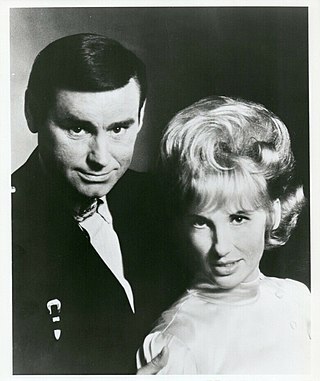
The discography of American country artists George Jones and Tammy Wynette contains the recordings they made as a vocal duo. Their discography includes nine studio albums, 14 compilation albums, 15 singles and one music video. In October 1971, the duo's first studio album was released by Epic Records and was titled We Go Together. It peaked at number three on the American Billboard Top Country Albums chart and number 169 on the Billboard 200 list. Included on the disc was the duo's first single, "Take Me". It reached the top ten on the American Billboard Hot Country Songs chart and the top 20 on the Canadian RPM Country Tracks chart. It was followed by their second studio album called Me and the First Lady, which charted at number six on the Billboard country list. Featured on the disc was their second top ten single, "The Ceremony".

The singles discography of American country artist, George Jones, contains 182 singles. Of the total, 136 were released with Jones as the solo artist. In addition, 31 were issued with Jones being part of a collaboration. Thirdly, eight singles were issued with Jones being part of a featured act. Fourthly, seven released were promotional singles. Additionally, 14 songs that are not released as singles are included that made any major chart. Finally, 21 music videos which were first issued as singles are also listed. Jones had his first chart success in 1955 with several top ten Billboard Hot Country Songs singles: "Why Baby Why", "What Am I Worth" and "You Gotta Be My Baby". After several more top ten releases, "White Lightning" became his first to top the Billboard country chart. Along with "Who Shot Sam", both singles were also his first to make the Hot 100 charts.
"If I Could Bottle This Up" is a song written by Paul Overstreet and Dean Dillon. It was recorded as a duet by country singers George Jones and Shelby Lynne and released as a single in September 1988, peaking at #43. It was Lynne's first single release and she would follow it with her debut LP Sunrise, which Billy Sherrill would also produce. The song would later surface on the Jones duet compilation Friends in High Places in 1991.







